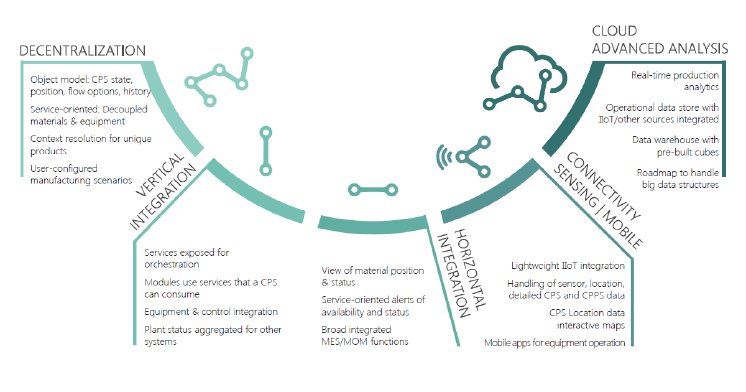What does Industry 4.0 mean for semiconductor manufacturers?
For the semiconductor industry, the high cost of wafer make attaching electronic components to each wafer carrier or FOUP completely viable and presents huge benefits in increased production efficiency. Adding intelligence to materials and products facilitates the fully decentralized operations model associated with Industry 4.0 (Picture). With devices communicating with each other, the increased flexibility and productivity this model produces will make it possible to meet an increasing demand for greater manufacturing mixes and individualized products at much lower costs. For the production of semiconductors in particular, the very nature of the product being manufactured means there may also be opportunity and added benefit for some devices to hold their own information without the need for additional electronics. The information gathered from the decentralized model and analytical software used in Industry 4.0 also makes it easier to account for the cost of each item, resulting in better intelligence for business strategy and product pricing.
Although equipment used in the production of semiconductors already have sensors and transmit intelligent information into wider systems, the concept of the CPPS using the IoT adds a new level of simplicity to this idea. The cost of production within the semiconductor industry also means that even marginal variable improvements through the increased use of big data analytics will have huge financial benefits. The Internet of Things (IoT) will further enhance flexibility in measurement and actuation possibilities and free manufacturers from the time and cost associated with changes to sophisticated interfaces on production equipment.
The smart marketplace
With components interacting with machines and having the information they need within them about the processing steps they require, this creates a smart marketplace where the CPS requests services (demand) and the CPPS provides them (supply). Using mobile communications and cloud computing, this can of course be further expanded into the wider supply chain.
The concept of Manufacturing as a Service (MaaS) is, to some extent, already present in the semiconductor industry. The full supply chain has many different steps and, because of the high value of the product, transportation costs become pretty much irrelevant. This means that processing steps can be geographically distributed and the smart marketplace bidding for the work can extend throughout the world.Different factories may compete with each other for procuring specific processing steps and still be competitive regardless of location. Industry 4.0 gives the industry all the tools it needs for a smart, highly efficient marketplace that can add significant production flexibility while reducing both costs and production times.
Read more in the next part 3/3!
